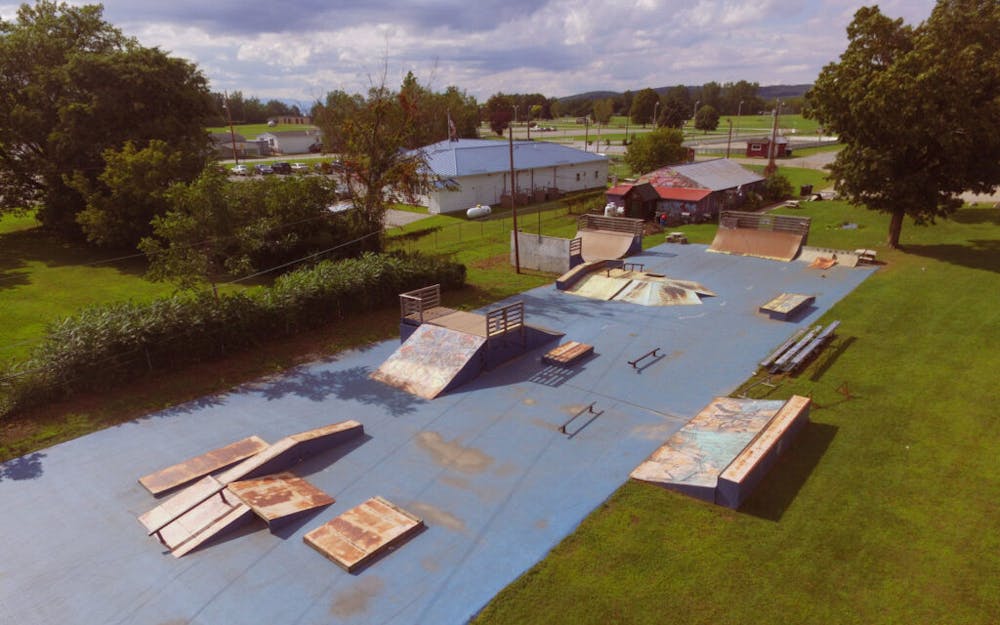After 25 years of local skaters practicing their flips and kicks turns in a skatepark with simple wooden and metal features, the town of Bristol, Vt. is fundraising to start construction on a new and improved 12,000-square-foot concrete skatepark.
The town hired Nor'Easter Skatepark — a New-England based skatepark design and construction company — to design the space, and composition plans for the park are nearly finalized. According to Taylor Welch-Plante, the leader of the project through her role as director of The Bristol Hub, the next step is to produce construction documents and to fundraise for the project’s costs. Nor’Easter Skatepark hosted a skatepark design meeting on April 3 at The Bristol Hub Teen Center to share their progress with interested community members.
Welch-Plante said that the wooden park was originally designed as a temporary structure, offering a lower-cost alternative to concrete. However, wood is less durable and safe. A concrete park has always been the long-term goal, and momentum to install one surged during the Covid-19 pandemic, as locals came to realize the importance of accessible outdoor community spaces.
Following a community input process prompted by American Rescue Plan Act (ARPA) funding, residents voted to prioritize skatepark renovations. The town allocated $140,000 to the effort and in February 2024, the community decided to move forth with a concrete skatepark.
“This changed the price tag significantly,” Welche-Plante said. “But it results in a much more solid art piece for the community that generations forward will be able to enjoy.”
The town applied for the Land and Water Conservation Fund (LWCF), a Vermont state fund, and grants from several nonprofits and corporations. Depending on how much money the town receives in grants, they will need to fundraise between $200,000 to $700,000 to meet a total cost estimated at around $800,000.
Construction will not begin until next summer, at the earliest.
“I’m pretty optimistic, I think there’s a fantastic amount of momentum and community support, and people who are eager to throw benefits and seek donations,” Welche-Plante said.
The skatepark will have banks, bowl features, half-pipes and rails. Accessibility is a key part of the design because Welch-Plante wants the park to be approachable to all participants.
“More advanced people can make a challenging feature by trying a harder trick or giving it more speed, but it's hard to make an advanced feature be accessible for beginners,” Welch-Plante explained.
Bristol’s current skatepark was built in 2000 and has undergone several transformations since then. Before its construction, youth skated on the roads and sidewalks in town, raising safety concerns from local pedestrians, businesses and the skaters themselves. Local business owners pushed for the creation of a space where teens could skateboard freely. After receiving seed money from several businesses and grants, the skatepark was created, composed of an asphalt base with wood and steel structures. The park expanded in 2011 to add new features, but many of its structures have since required rebuilding or demolishment due to rot.
Welch-Plante hopes the new skatepark will draw people to Addison County. In light of the new Middlebury skatepark, Bristol is excited for the parks to highlight the area as a location to explore action sports.
Skateboarding, in addition to being a physical outlet, has its own culture, Welch-Plante said. For people who do not connect with traditional sports, skateparks can be welcoming “third” space to find community.
Scootering has become especially popular at the skatepark because it is the most accessible of skating options, reducing the barrier to entering using the space, according to Welch-Plante. The hub provides scooters and helmets for youth who want to explore the skatepark but are not looking to commit to the steep learning curve of skateboarding.
“The skatepark is a prime example of that space where families and community members can gather and participate in this fun recreational space,” Welch-Plante said.
Editor’s Note: Managing Editor Madeleine Kaptein ’25.5 contributed reporting to this article.




